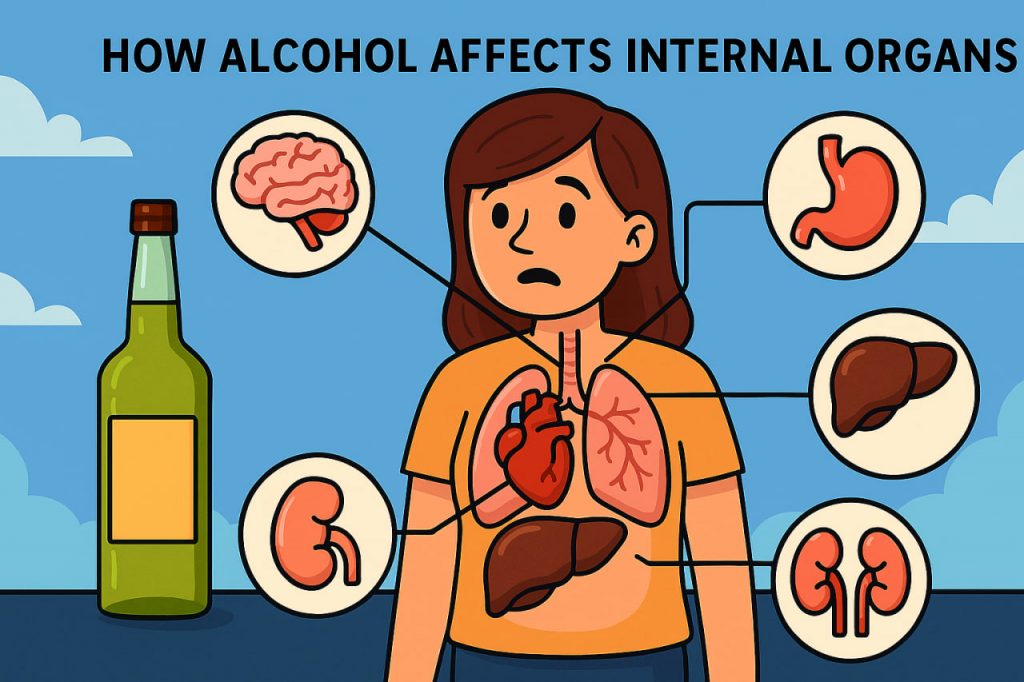Alcohol is a legal and widely consumed substance, but it has profound effects on nearly every organ in the human body. Alcohol consumption can damage vital organs and disrupt essential bodily functions over time.
Understanding how alcohol affects each internal organ helps highlight the importance of healthy lifestyle.
Liver: The Primary Target
The liver is the body’s main detox center, responsible for breaking down alcohol. However, alcohol is toxic to liver cells.
- Fatty liver disease can develop after short-term heavy drinking.
- Alcoholic hepatitis involves liver inflammation, which can be life-threatening.
- Cirrhosis is the irreversible scarring of liver tissue that disrupts liver function.
- The liver’s ability to process nutrients, hormones, and toxins becomes impaired.
Once liver damage progresses, it becomes harder for the body to remove waste products from the blood.
Brain and Nervous System
Alcohol is a central nervous system depressant, which means it slows down brain function. Effects include:
- Impaired judgment, coordination, and reaction time even after small doses
- Memory issues and blackouts
- Mood swings and increased risk of depression and anxiety
- Long-term damage to the brain structure, including shrinkage of brain tissue
- In severe cases, chronic alcohol use can lead to alcohol-related dementia
The brain is highly sensitive to alcohol, and it impacts mental health and cognitive performance.
Heart and Blood Vessels
While light drinking has sometimes been associated with certain heart benefits, alcohol harms the cardiovascular system:
- High blood pressure
- Irregular heartbeat (arrhythmia)
- Weakened heart muscle (cardiomyopathy)
- Increased risk of heart attacks and stroke
Alcohol consumption increases the likelihood of clot formation and damages the lining of blood vessels.
Pancreas
The pancreas helps regulate blood sugar and aids in digestion. Alcohol disrupts its functions by causing inflammation and triggering the release of harmful digestive enzymes within the organ itself.
This can lead to:
- Acute or chronic pancreatitis, a painful and serious condition
- Poor regulation of blood sugar, increasing the risk of type 2 diabetes
Chronic damage to the pancreas often goes unnoticed until severe symptoms arise.
Stomach and Digestive System
Alcohol irritates the lining of the stomach and intestines, potentially causing:
- Gastritis (inflammation of the stomach lining)
- Ulcers
- Nausea, vomiting, and bloating
- Reduced absorption of essential vitamins like B12, folate, and thiamine
Over time, poor digestion and nutrient deficiencies can contribute to fatigue and immune dysfunction.
Kidneys and Bladder
Alcohol is a diuretic, meaning it increases urine production. This can lead to:
- Dehydration
- Electrolyte imbalances
- Strain on the kidneys, especially in people with preexisting conditions
- Increased risk of bladder infections and urinary tract issues
Chronic use may reduce the kidneys’ ability to filter waste efficiently.
Immune System and Cancer Risk
Alcohol weakens the immune system, making the body more vulnerable to infections. It also increases the risk of several types of cancer, including:
- Liver cancer
- Breast cancer
- Esophageal and throat cancer
- Colorectal cancer
Glossary
- Cirrhosis – Permanent scarring of the liver due to long-term damage.
- Pancreatitis – Inflammation of the pancreas.
- Cardiomyopathy – A disease of the heart muscle that affects its ability to pump blood.
- Diuretic – A substance that increases the amount of urine produced.
- Gastritis – Inflammation of the stomach lining, often caused by irritation or infection.


